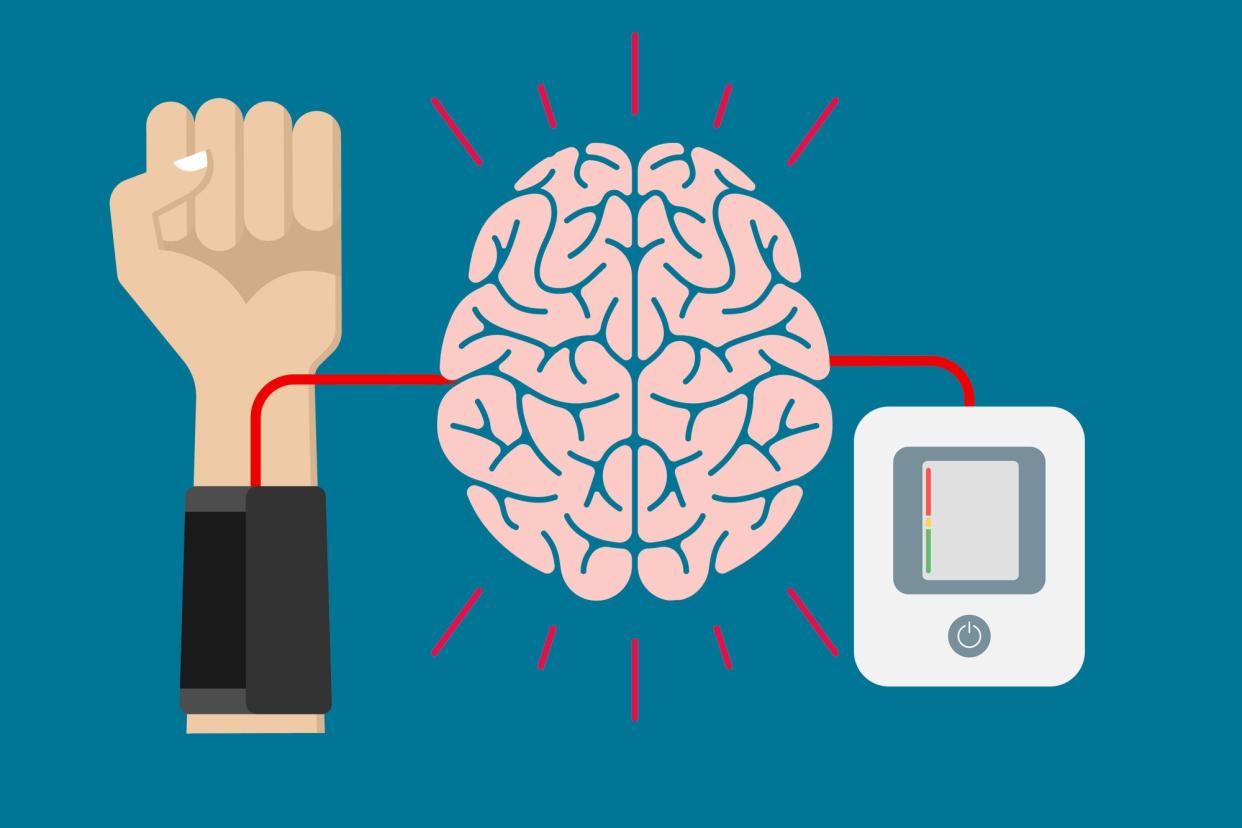Lowering Blood Pressure Might Help You Feel Less Anxious, New Research Suggests

Getty Images
From the way gut health impacts our anxiety levels to how diet can boost mood and the importance of social connections for dementia risk, it's becoming more and more evident that mental health and physical health are remarkably intertwined.
Previous research in this field usually proves correlation rather than causation, though. That means that the findings often leave us with a chicken-or-egg dilemma: Does good physical health lead to fewer mental health challenges, or do mental health struggles make it harder to choose healthier physical habits?
A new study sheds light on a very common physical health woe, high blood pressure, and one mental state that researchers believe that may be directly caused by the condition.
According to the Center for Disease Control and Prevention (CDC), nearly one in two Americans have been diagnosed with high blood pressure. This not only puts us at higher risk for several chronic health conditions, including heart disease and dementia, but high blood pressure also increases the likelihood that an individual might have a specific personality trait: neuroticism, a new study published November 21, 2022 in the journal General Psychiatry suggests.
Neuroticism, by the way, is not a mental health disorder at all. But people with neurotic tendencies tend to be prone to viewing the world through a more negative lens, and can be at higher risk for some mental illnesses, such as mood disorders, anxiety disorders and schizophrenia.
Read on to learn more about how they determined this connection, plus the best action plan to take care of your heart and your anxiety levels all at once.
Related: 5 Sneaky Reasons Your Blood Pressure is High, According to a Dietitian
What This Blood Pressure Study Found
The scientists on this research team looked at data from four different components of blood pressure:
Systolic blood pressure; the top number in a blood pressure reading, which is a measure of pressure exerted against artery walls as your heart beats
Diastolic blood pressure; the bottom number in a blood pressure reading, which is a measure of pressure in your arteries between beats
Pulse pressure; the difference between systolic and diastolic
Hypertension (or elevated blood pressure) in general
The goal of their study was to determine if they could find a causal relationship between any or all of these four different data points and four different psychological states:
Anxiety
Depression
Neuroticism
Subjective well-being
Using a technique called Mendelian randomization, which involves looking at gene variants to try to spot if any one factor is causing a specific outcome, and genome-wide association studies, the scientists found that most of the connections they saw were not significant enough to deem conclusion-worthy. The exception: The link between diastolic blood pressure and neuroticism. An elevated diastolic blood pressure (as a reminder, that "80" in the 120/80 mmHg reading) appears to have a significant genetic causal effect on neuroticism rates.
That being said, neuroticism isn't necessarily a bad thing. While those who err on the neurotic side are often more sensitive to their emotions and surroundings, which can lead to more worrying or anxiety, they are also often incredible planners and come prepared for tasks they're alerted about in advance. Still, the opposite of "neurotic" in the Big Five Personality Traits is emotional stability; a state that most of us seek out.
Based on their findings, the scientists note in their study that "appropriate management of BP may reduce neuroticism, neuroticism-inducing mood disorders and cardiovascular diseases" (since blood pressure plays a role in heart disease risk, too). The reason for the direct causal relationship is difficult to pin down, the authors admit, and they hope to dive into this more in the future—and among a more diverse and larger pool of participants.
Related: 8 of the Best Anti-Inflammatory Foods for Anxiety
The Bottom Line
This new study suggests that high blood pressure, in particular diastolic blood pressure, may lead to increased neuroticism and anxious feelings. And on the flip side, keeping blood pressure within a "normal" range can help you keep your cool and maintain emotional stability.
This finding adds to a growing pool of research that advocates the importance of keeping blood pressure within a healthy range of less than 130/80 mmHg.
Some of our overall blood pressure profile is written in the stars—okay, our genes—but a lot of our overall risk rate can be impacted by our lifestyle habits. If the approaches below don't move the needle, or in cases of severe hypertension, doctors often recommend blood pressure-lowering medication in tandem with these heart-healthy habits.
Managing blood pressure involves a multifaceted strategy, which your medical team can help define. In general, these strategies can help tame your ticker's elevated blood pressure—and certainly can't hurt in terms of your mood, too!
Following a low-sodium diet (our guide to the best and worst foods for healthy blood pressure and our healthy high-blood pressure meal plan for beginners offer loads of inspiration)
Staying active (ideally meeting the WHO's physical activity recommendations of 150 minutes of moderate or 75 minutes of vigorous aerobic exercise per week, plus two total-body strength training sessions)
Stopping smoking (if you currently smoke)
Drinking alcohol in moderation (defined as up to one to two standard alcoholic drink per day)
Up Next: 17 High Blood Pressure-Friendly Dinners You'll Want to Make Forever

